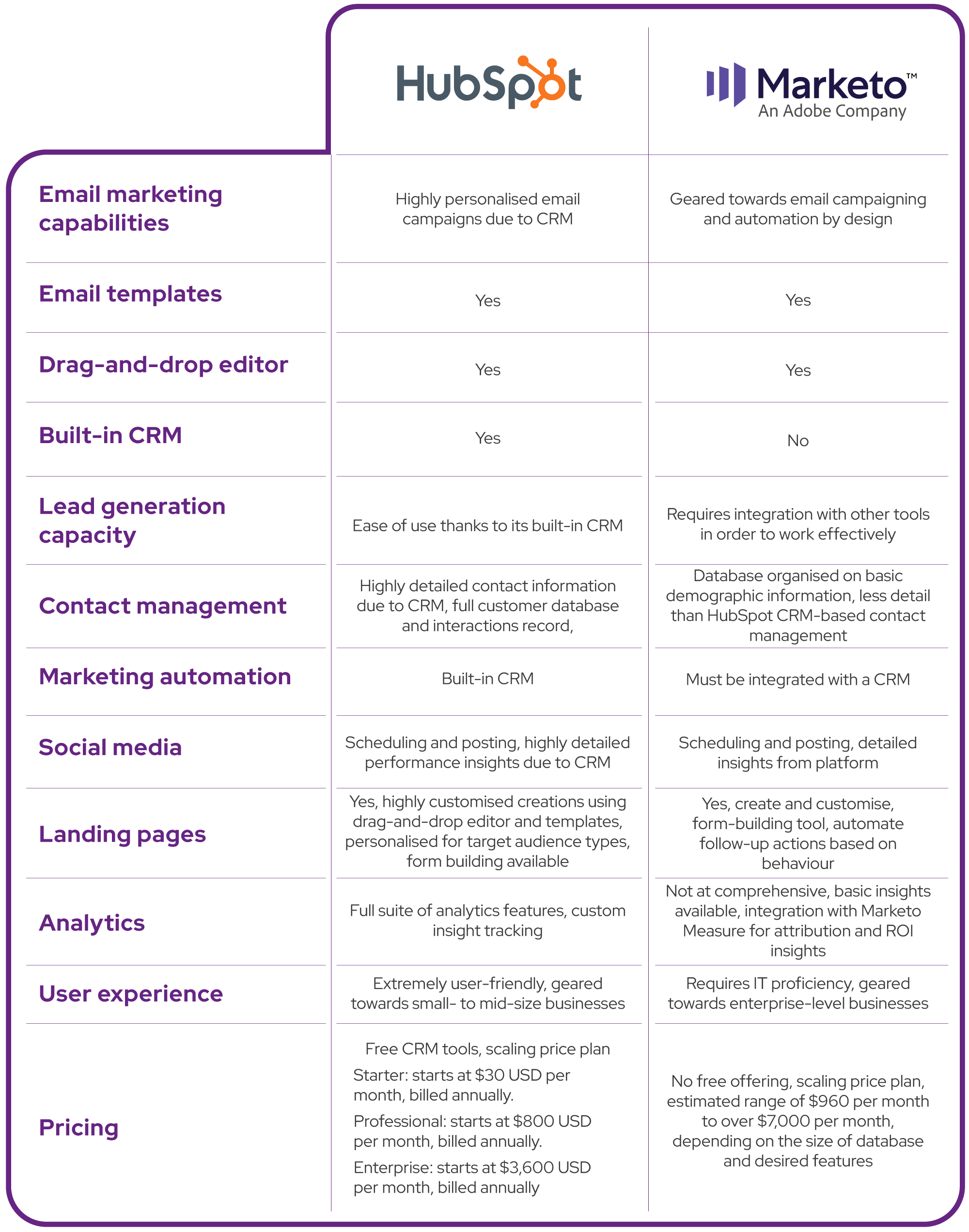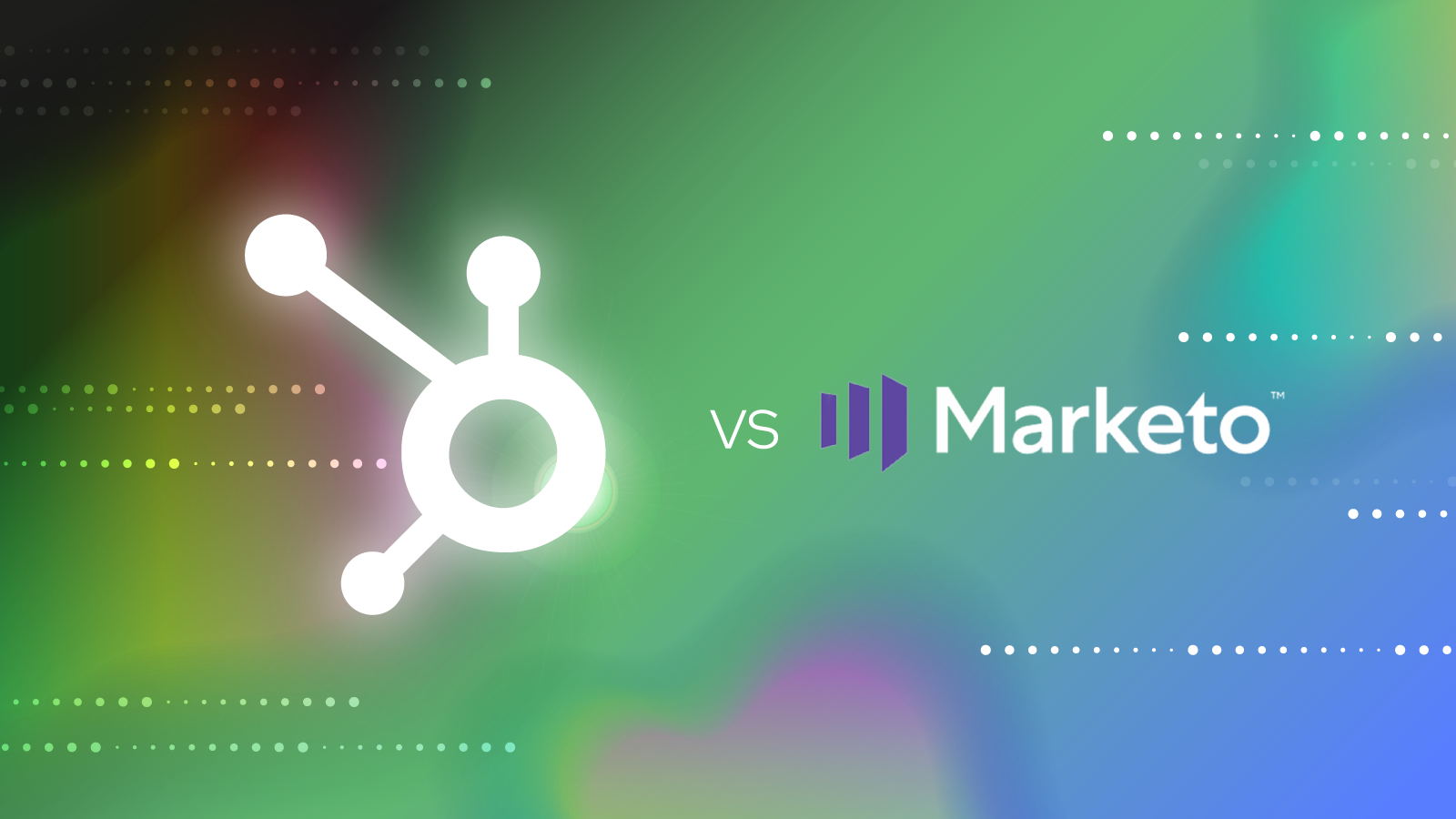Digital marketing is an integral part of business strategy today, and organisations are finding themselves spoilt for choice when it comes to choosing a martech platform to run their marketing and sales management smoothly.
With HubSpot, Marketo, and so many other platforms out there, choosing the right one for your business may feel like a daunting task! In this article, we’ll take a look at two strong contenders for your software solution; HubSpot and Marketo.
Marketing automation and lead generation software will save your team valuable time by taking care of the mundane tasks that come with contact management, reporting, and the other various tasks that slow businesses down. Let’s take a look at some recent statistics around marketing automation software. If you’re on the fence about these platforms, here is some perspective!
- Between 2019 and 2020, marketing technology tools were the fastest growing out of all martech solutions, growing by 25% over a one-year period, and usage is continuing to grow today. (Statista, 2023)
- In a February 2023 survey, 65% of marketers indicated that they had relatively successful results since implementing marketing automation software. (Statista, 2023)
- The global marketing automation industry is set to reach $5.9 billion USD in 2023, and this annual value is projected to more than double by 2030, surpassing $13.7 billion USD. (Statista, 2023)
- 80% of companies have seen an increase in leads since implementing marketing automation. (Invesp, 2023)
- 77% of companies using marketing automation tools have seen an increase in conversions. (Invesp, 2023)
- 75% of all companies utilise at least one type of marketing automation tool. (StartupBonsai, 2023)
If anything is for certain, it’s that marketing automation is here to stay and growing fast. We have to pick a tool for us and our business, so let’s explore what HubSpot and Marketo have to offer.
What is HubSpot?
HubSpot is an inbound marketing, sales management and service platform. Its Marketing Hub is a powerful marketing automation tool that enables users to create and deliver high-impact, CRM-powered marketing. With a powerful suite of tools that seamlessly integrate with your customer data, HubSpot’s Marketing Hub provides everything you need to create successful automated inbound marketing campaigns. It offers multiple features, including email and inbound marketing, website CMS, customer service, and performance analytics.
What else does the Marketing Hub offer?
- Email marketing
- Account-based marketing
- Marketing automation, across multiple channels and customisable workflows
- Blogging
- A form builder
- Landing pages and landing page reporting
- Customisable reporting layouts
- Contact management
- Live chat
- Facebook, Google, and LinkedIn ads
- Traffic and conversion analytics
- Ad retargeting
HubSpot has also won numerous awards, including the #1 Global Software Company at G2’s 2023 Best Software Awards, G2’s Overall Best Product for Marketers, and the Gartner Peer Customer Choice Awards in 2022.
Apart from official recognition, HubSpot also brings in great reviews, with one G2 reviewer saying that “HubSpot Marketing Hub offers a suite of tools for inbound marketing, including email marketing, social media management, lead generation, and analytics, all in one platform, making it easy to manage marketing campaigns. The platform is designed to be intuitive and user-friendly, with drag-and-drop editors, customizable templates, and simple navigation.
HubSpot Marketing Hub includes robust automation capabilities, allowing businesses to streamline their marketing processes and save time. It integrates seamlessly with other HubSpot products, such as the Sales and Service Hubs, to create a comprehensive platform for managing the entire customer journey.
Overall, the HubSpot Marketing Hub offered improved efficiency, better lead generation, and a more cohesive and effective marketing strategy.”
With such a comprehensive list of features, numerous awards, and great reviews, it’s easy to see why HubSpot is the platform of choice for many marketers.
What is Marketo?
Marketo is a marketing automation software owned by Adobe. The platform provides lead generation and management, email marketing, and marketing automation, among others. It is a standalone tool that requires integrations in order to serve as a part of a full marketing automation suite.
Marketo is designed to deliver email campaigns and offers various optimisation tools, event-based triggers, lead nurturing workflows, A/B testing, and reporting and analysis.
Marketo’s features include:
- Lead management, nurturing, and scoring
- Email marketing
- Website personalization
- Campaign and web activity reporting and analysis
- SEO (search engine optimisation)
- Social marketing
- CRM integration capabilities
- Campaign dashboards and reports
- Marketing calendar
- Digital ads
- Anonymous retargeting
Ranked fifth for customer satisfaction in Trust Radius’s Top Rated 2022 awards, and 14th in the Crozdesk Marketing Automation Software Awards 2023, Marketo is a favourable choice for many marketers. The software has many great reviews, with this G2 reviewer saying it “provides a highly effective and easy-to-use marketing platform for rapid expansion into local and international markets.
Its analytics allow me to generate more accurate mailing lists with a higher level of segmentation in terms of personas and audience preferences. In addition, Marketo's automation capabilities allow me to quickly build detailed customer profiles while effectively deploying intelligent campaigns such as email invitations, reminders or event follow-ups across all of my communication initiatives. All of these features make it a valuable digital asset indeed!”
Both platforms have many attractive features going for them, and, of course, each will have its own drawbacks when it comes down to the unique requirements you might have for your business. Let’s take a look at what HubSpot and Marketo offer in some crucial areas, including:
- Email marketing
- Lead generation
- Contact management
- Marketing automation
- Social media and ads
- Landing pages and forms
- Insights, reporting, and analytics
- Pricing
Email marketing
Marketo’s core features focus on email campaigning, specifically automation and email nurturing. Users can choose from a wide range of ready-made email templates or design campaigns of their own using a simple drag-and-drop design tool.
The platform also works with a “trigger” function where you can set up personalised emails sent to customers based on user activity and for audience segmentation. You are also able to track campaign performance on Marketo’s dashboard feature, allowing you to monitor results in real time and make any necessary adjustments.
HubSpot for email marketing provides users with a wealth of tools to execute successful email campaigns. A distinguishing feature of HubSpot is its built-in CRM (customer relationship management) system, something that Marketo does not have. The CRM allows you to gain much deeper insight into your leads and contacts, and can therefore create tailored email campaigns that reach your target audience effectively. HubSpot also offers a range of email templates and a drag-and-drop editor tool, giving it the same footing as Marketo in this category.
Lead generation
Marketo also offers useful tools to score and nurture leads. Marketo’s lead scoring function can be used to segment potential customers into prospects and leads using a scoring system, which is based on the demographics and behaviours of the lead. You are able to set the parameters for your scoring model and therefore customise your lead generation workflow to suit your requirements.
HubSpot’s CRM makes it a far more comprehensive tool for precise lead generation. It needs no integrations, which, unfortunately, Marketo does require in order to utilise a CRM system. HubSpot also offers an extensive range of tools and features that all support lead generation campaigns, including forms and landing pages, lead tracking and scoring, and detailed analytics. All of these tools are on HubSpot, in one platform. While Marketo can access these functions, it is a case of integrating and setting up various aspects within the software in order for it to happen.
Contact management
HubSpot offers a set of robust contact management features to help businesses manage and organise their contacts. The platform offers a customer profile database that keeps a detailed record of all contact interactions. Users can create custom fields and tags to organise their contacts based on any criteria they choose.
With such attention to detail, you can create highly targeted content and campaigns for a specific audience. Thanks to the CRM capabilities it offers, you can also see the entirety of your customer or lead’s interaction with your marketing campaigns; when they open an email, how they engage with your website or social media, etc.
Businesses can also segment their contact database on Marketo, based on various criteria such as demographics, behaviour, engagement levels, etc. And, as mentioned, you are able to use these insights to create effective lead-scoring models. However, without integrations, Marketo will manage contacts and leads based on less information and analysis than HubSpot will.
Marketing automation
Marketo is considered one of the industry leaders in marketing automation software. As mentioned, however, it does not have a built-in CRM and must be integrated with other solutions, like Salesforce. Unfortunately, Marketo has not developed any on-platform CRM solutions.
With HubSpot, email, social media, and general campaign management workflows can also be automated, with actions being initiated through an “if this, then that” response system based on the lead’s interaction with your campaign. Additionally, the level of insight the HubSpot CRM provides means that you can monitor campaign engagement at a granular level, helping you target your audience as precisely and enticingly as possible.
Social media and ads
Both Marketo and HubSpot offer social media capabilities, including scheduling and automated posting. Integration and set-up with your social media accounts are required for both platforms. However, it is worth noting that from a reporting perspective, you are able to gain more information about your social media campaigns through HubSpot. These insights are important to have, simply because it negates the chances of putting out content that is not reaching your specific audience. The more information you have to mitigate that waste of time and resources the better!
Landing pages
Attractive, functional landing pages are a critical part of lead generation and nurturing, as it forms part of the buyer’s journey a potential customer will travel along when engaging with your company. HubSpot and Marketo both offer landing page capabilities, as well as A/B testing for landing pages.
With Marketo, you are able to create and customise landing pages using the drag-and-drop feature provided. The platform also offers a form-building tool that allows for customisation as well. In addition, Marketo's landing pages are able to integrate with the platform's marketing automation capabilities, allowing you to automate follow-up actions based on visitor behaviour.
HubSpot provides a variety of solutions for landing page creation, with customisable templates and personalisation options that draw out specific data using your CRM. You can create personalised landing pages for specific audiences and embed created lead capture forms on your landing pages to capture visitor information. Ultimately, HubSpot offers more personalisation and customisation on landing pages, allowing you to create and implement precisely what you need for your lead generation purposes.
Analytics, reporting, and insights
With HubSpot, all necessary analytics information is available in one place. The reporting features the platform offers are standard, meaning there is no need for integrations or additional setups in order to utilise it. HubSpot provides analytics for email, social media, website, and sales, among others. Its reporting structure and dashboard are fully customisable as well, allowing you to pinpoint the exact information and insight you require. From top-of-funnel performance metrics to multi-touch revenue attribution, HubSpot offers a comprehensive set of reporting tools and functions.
Marketo provides insight for high-level engagement analytics through to basic revenue reporting. Performance, revenue, leads, website, landing page, and social media reporting is all provided by Marketo. However, the platform’s overall offering is not as broad as HubSpot’s. For attribution & ROI reporting you will need to integrate Marketo with a specific attribution tool such as Marketo Measure (formerly Bizible).
Pricing
If one thing is certain, HubSpot has an advantage over Marketo by virtue of the fact that it has a built-in CRM and Marketo does not. What cinches this, however, is that HubSpot’s CRM is free to use. This is a truly significant difference between the two platforms. Aside from that, both offer various pricing plans which naturally scale the larger the capacity of the plan. HubSpot moves from the free tools through to its Starter, Professional, and Enterprise plans. Marketo has a similar set up, albeit no free features, and moves from Select to Prime, Ultimate, and Enterprise.
The pricing comparisons and inclusions can be viewed in the table below.

There is merit to both HubSpot and Marketo as marketing automation platforms, and it ultimately comes down to your business’s unique requirements. That being said, HubSpot certainly offers more features for far greater user-friendliness. And although Marketo is geared more towards enterprise-level organisations, HubSpot has its own plan to match and brings its more comprehensive list of features to the table along with scaling capacity. HubSpot is the software of choice by a large margin for many marketers, and it’s not difficult to see why!
Get in touch with us today and find out more about how HubSpot can help you.


